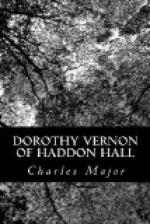After that supper, in rapid succession, followed hunting and drinking, feasting and dancing in my honor. At the dances the pipers furnished the music, or, I should rather say, the noise. Their miserable wailings reminded me of Scotland. After all, thought I, is the insidious, polished vice of France worse than the hoggish, uncouth practices of Scotland and of English country life? I could not endure the latter, so I asked Sir George, on the pretext of ill health, to allow me to refuse invitations to other houses, and I insisted that he should give no more entertainments at Haddon Hall on my account. Sir George eagerly acquiesced in all my wishes. In truth, I was treated like an honored guest and a member of the family, and I congratulated myself that my life had fallen in such pleasant lines. Dorothy and Madge became my constant companions, for Sir George’s time was occupied chiefly with his estates and with his duties as magistrate. A feeling of rest and contentment came over me, and my past life drifted back of me like an ever receding cloud.
Thus passed the months of October and November.
In the meantime events in Scotland and in England proved my wisdom in seeking a home at Haddon Hall, and showed me how great was my good fortune in finding it.
Queen Mary was a prisoner at Lochleven Castle, and her brother Murray had beheaded many of her friends. Elizabeth, hating Mary as only a plain, envious woman can hate one who is transcendently beautiful, had, upon different pretexts, seized many of Mary’s friends who had fled to England for sanctuary, and some of them had suffered imprisonment or death.
Elizabeth, in many instances, had good cause for her attitude toward Mary’s friends, since plots were hatching thick and fast to liberate Mary from Lochleven; and many such plots, undoubtedly, had for their chief end the deposition of Elizabeth, and the enthronement of Mary as Queen of England.
As a strict matter of law, Mary was rightful heir to the English throne, and Elizabeth was an usurper. Parliament, at Henry’s request, had declared that Elizabeth, his issue by Anne Boleyn, was illegitimate, and that being true, Mary was next in line of descent. The Catholics of England took that stand, and Mary’s beauty and powers of fascination had won for her friends even in the personal household of the Virgin Queen. Small cause for wonder was it that Elizabeth, knowing all these facts, looked with suspicion and fear upon Mary’s refugee friends.




